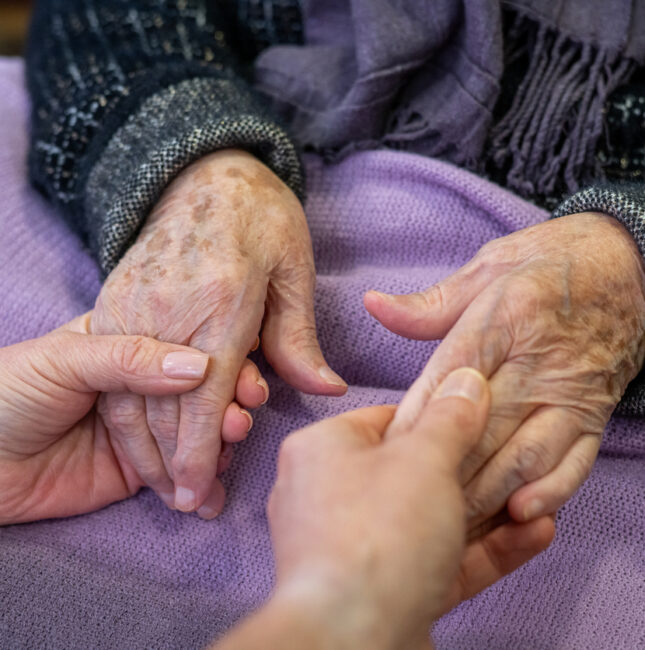How to support someone struggling with their mental health
February 5, 2024
Has someone ever come to you and shared that they were having some mental health concerns, and you found yourself lost for words? If so, you are not alone. Our human instinct is to make the person feel better, so we want to tell them they’ll be okay. We want to relay stories of people who’ve come through the other side. We want our loved one to see a glimmer of sunshine in the darkness they are drowning in. But any attempt of positivity on our end is met with resistance … and we are left there, helpless, confused and with no idea where to start.
Sound familiar? CatholicCare’s counselling team have put their heads together to answer some frequently asked questions on this topic.
Q. Someone has shared with me that they are struggling with their mental health. Where do I even begin?
A. The most important thing to do is listen, genuinely and without judgement. If someone approaches you, it is a sign that they trust you and feel comfortable confiding in you. They are seeking help, so it is important to recognise this as an opportunity to connect and to support this person. If throughout this conversation you identify that the person has self-harm or suicidal thoughts, it is important that you stay with them and seek professional help.
Q. What are some helpful things to say to someone who is dealing with mental health concerns?
A. Focus on language that connects with the person’s emotions, acknowledging and validating their concerns. For example:
“I’m here for you.”
“You are not alone.”
“Let’s talk about it.”
“What do you need, can I do something to help you?”
Q. What should I avoid saying?
A. It is important to avoid saying anything that dismisses or criticises a person’s emotions. It is also important not to minimise how the person is feeling. For example:
“Don’t worry about it.”
“You will be fine.”
“You are just trying to get attention.”
“Everyone feels like that at times.”
Q. I always seem to get so invested with the person I am helping. How do I set boundaries without it seeming like I don’t care?
A. It is important to be honest and transparent about what you can and cannot do as this builds trust with the person. Once you have acknowledged and validated the person’s words and emotions, it is okay to consider what you need to do and ensure that you meet your own needs as well as helping the person with their needs.
Remember, setting boundaries is a healthy practice that allows you to offer sustainable support. It doesn’t mean you care any less; in fact, it helps ensure that you can maintain a long-term and meaningful connection with the person you’re helping. For example:
“I care about you, and I want to help as much as I can. I know you need support right now but shortly I will need to pick up my children/ attend a work meeting so is there someone we can call to be with you? I will pick up my children/attend my meeting and then call you to check on you and make a plan together.”
Q. What are the signs that someone is not OK?
A. Signs of declining mental health can look very different in everyone. However, some of the common signs to look for include:
- Changes in behaviour
- Changes in mood – looking sad or irritable often
- Withdrawing from social activities or events
- Not sleeping
- Being unwell often
- Losing interest in activities that they normally like to do
- Work performance changing
- Feelings of overwhelm
Remember to call 000 immediately if you or someone you know is in a life threatening emergency.
For support around the clock, here is a helpful list of 24/7 counselling and support services.
When feelings become overwhelming or confusing, counselling can be very helpful. At CatholicCare we work with you or your loved one to overcome challenges and stress. We listen, talk through experiences and help you think about ways forward. To find out more about how CatholicCare can help, visit our site here, email us info@catholiccaredbb.org.au or call us today on 1800 324 924.
More news stories like this one
Introducing Crossroad Companions end of life service
When you receive a terminal diagnosis, life can suddenly feel uncertain and overwhelming. Questions arise, roles change, and you may find yourself moving from one medical team to the next. We're here to help.
Read MoreWorld Day of Social Justice – injustice isn’t accidental
World Day of Social Justice isn’t about slogans or good intentions. It’s about facing an uncomfortable truth - the systems we live within do not work equally for everyone, and pretending otherwise costs people their dignity, safety and hope.
Read More70 coffees for one great cause – Dom’s Place!
Eight Dom’s Place visitors recently completed barista training but the coffee cart isn’t just about serving coffee - it’s a practical way for them to develop pre-employment skills while contributing to the community.
Read More


